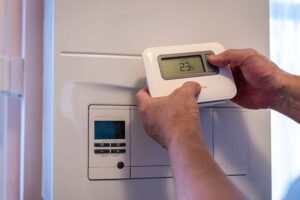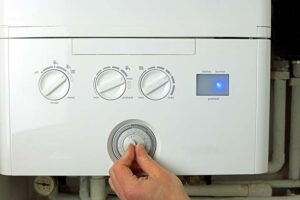If you buy, sell or rent a home in the UK, you have heard of an EPC rating. But what is an EPC ranking, and why is it important?
In this guide we will explain what EPC ranking means, how it works and how it affects you. Whether you are a homeowner, tenant, Zamindar or real estate investor, understanding of the EPC ranking can help you save money and reduce your carbon footprint.
What Is an EPC Rating?
An EPC ranking is for the Energy Performance Certificate. This tells you how effective a building is. The ranking goes from one (most effective) to G (at least effective).
You can think about it, such as the energy century you see, such as looking at devices such as refrigerators or washing machines. The EPC ranking shows how much it costs to heat a house and provide power, and how much CO2 it produces.
Each house in the UK that is sold or employed shall have a valid EPC certificate. It helps buyers or tenants to understand what their energy bills will be and whether the property is environmentally friendly.
EPC Rating Scale Explained
Here’s a breakdown of the EPC rating scale:
- A: Very energy efficient (the best rating)
- B: Highly efficient
- C: Above average efficiency
- D: Average efficiency
- E: Below average
- F: Poor energy performance
- G: Very poor (the worst rating)
Most houses in the UK come between EPC ranking C and D. An assessment of D is considered average, while E means that the house may cost more to run. Most homeowners need to promote the scale by improving goal energy performance.
What Affects an EPC Rating?
Several factors influence the EPC score. Here’s what the energy assessor looks at during the inspection:
1. Insulation
Better insulation means less heat escapes. Loft, wall, and floor insulation all impact the rating.
2. Windows and Doors
Double glazing improves energy efficiency by reducing heat loss and blocking drafts.
3. Heating Systems
Modern boilers and heating controls (like thermostats and timers) can boost your rating.
4. Lighting
Energy-efficient bulbs like LEDs improve the score.
5. Renewable Energy Sources
Solar panels, heat pumps, or wind turbines increase energy efficiency and reduce reliance on fossil fuels.
6. Hot Water System
Efficient hot water systems and good insulation for pipes and tanks can help the rating.
EPC Requirements in the UK
In the UK, EPC certificates are a legal requirement when:
- You sell a property
- You rent out a home
- You build a new property
EPC should be available before going to the real estate market. The landlords should ensure that the property meets the minimum EPC ranking requirement, which is currently e or above. The properties of F or G rankings are not legally allowed to rent until the discount is not allowed.
The EPC is valid for 10 years from the date of issue.
How to Get an EPC Certificate?
Getting an EPC is a simple process:
1. Hire a certified EPC assessor
Only accredited professionals can carry out the inspection. You can find assessors on the UK Government EPC register.
2. Book an assessment
The assessor visits your property and carries out a survey. It usually takes about 30-60 minutes.
3. Receive the EPC certificate
After the assessment, you’ll get a certificate with the current EPC rating and advice on how to improve it.
EPC cost: The price may vary between £60 and £120 depending on the size of your location and property.
EPC Checklist - What to Prepare for the Visit
Before the assessor visits your home, it’s helpful to be ready. Here’s a quick EPC checklist:
- Access to the loft, boiler, and hot water tank
- Details of any insulation
- Info on double glazing or window upgrades
- Records of renewable installations like solar panels
- Manuals for heating systems or thermostats
How to Improve Your EPC Rating?
If your EPC ranking is low (e.g. D, E or Bottom), do not worry. There are steps you can do to market your score.
Here’s how to improve your EPC rating:
1. Add or Upgrade Insulation
This is the most cost-effective way to improve your rating. Start with the loft and cavity walls. Floor insulation also helps.
2. Upgrade the Boiler
Old boilers are inefficient. A modern condensing boiler can drastically cut energy use.
3. Install Double Glazing
If your windows are single-glazed, upgrading to double windows can reduce heat deficiency.
4. Switch to LED Lighting
This is a low-cost upgrade that can make a small but noticeable difference.
5. Use Smart Heating Controls
Thermostats, programmers, and TRVs (thermostatic radiator valves) help control heat usage more efficiently.
6. Install Renewable Energy
Solar PV panels, heat pumps or solar heating can increase the EPC point and reduce the energy bill.
Even small changes such as sealing the draft or adding radiator reflexes can help.
Why Is the EPC Rating Important?
Knowing your EPC rating can benefit you in many ways:
- Lower energy bills – A better rating means the home uses less energy.
- Higher property value – Buyers are drawn to energy-efficient homes.
- Legal compliance – Landlords must meet EPC rating requirements.
- Environmental impact – Efficient homes reduce carbon emissions.
- Government incentives – You may qualify for grants or funding if you upgrade your home.
Common EPC Rating Levels in the UK
Here’s what some of the common ratings mean in real life:
- EPC Rating C – This is considered good. Newer homes or upgraded older ones often fall into this range.
- EPC Rating D – This is average. Many homes in the UK still sit here.
- EPC Rating E – Below average. Energy costs are higher, and rental properties with this rating may be close to failing legal standards.
EPC Ratings for Landlords
If you are a landlord in the UK, EPC rules are strictly used on you. Since April 2020, rental properties should have EPC rankings on E or above.
If the property is rated to F or G, you cannot legally give it until you improve or register for discounts.
Improvement in EPC ranking not only avoids fines, but can also attract better tenants and increase rental income.
Are There Penalties for Not Having an EPC?
Yes. Failing to provide a valid EPC when required can lead to:
- Fines of up to £5,000
- Delays in property sales
- Inability to legally rent the property
So it’s essential to keep your EPC certificate up to date and meet EPC requirements.
EPC for New Builds
Newly built homes must also have an EPC. In fact, they usually score quite well due to modern building regulations. These homes often achieve EPC ratings of A or B.
Before completion, the builder arranges an EPC as part of the handover process. This must be available before the property is marketed or sold.
The Future of EPC Ratings
As the UK government works towards Net Zero carbon emissions by 2050, EPC ratings are becoming more important.
There is talk of tightening regulations. For example, landlords may soon need a minimum EPC rating of C to let a property. Homeowners may also see more incentives to improve energy efficiency.
So it’s a smart move to start improving your home now.
Final Thoughts
So, what is an EPC ranking? This is just more than a legal requirement. It is an important indicator of how efficient, cheap and environmentally friendly in your home.
Whether you buy, sell, rent or just want to cut the energy bill, and know that your EPC ranking helps you create a smart option. Improving your EPC rating can provide the UK’s value, save money and protect the planet.
If you are unsure of your current rating or want to know how to get EPC certificates, you can start by ordering an evaluation. Then follow the EPC check list to prepare you for your trip. Finally, take steps to upgrade your home and see an increase in your score.
Frequently Asked Questions
An EPC ranking shows how effective a property is. It is used to assess energy costs and compliance with buyers, tenants, landlords and hostages.
An EPC certificate is valid for 10 years from the date of issue.
You can check the EPC rating of your property in the British Government’s EPC register.
Yes, but buyers may be discouraged if the rating is low. Improving the rating can help the sale process.
Some green mortgage products offer better rates for homes with high EPC ratings. It’s becoming more relevant in financial decisions.







